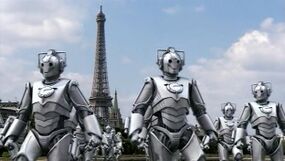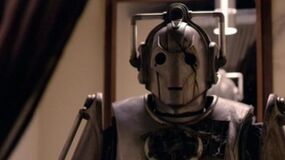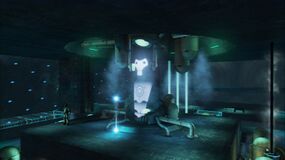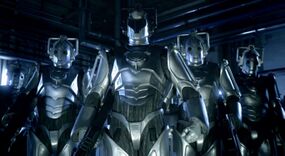More languages
More actions
- This article is an overview of the concept of the Cyberman. You may be looking for more specific versions, including those from Mondas and those from Pete's World
Cybermen were a "race" of cybernetically augmented humanoids. They varied greatly in design, with different factions throughout time and space. The two major groups, from which all other known versions derived, were the Mondasian Cybermen, which originated on the planet Mondas – Earth's twin planet in the Doctor's universe – and the Cybermen created by Cybus Industries, which originated on Earth in an alternate universe.

Despite the different origins, there were similarities between both groups of Cybermen, and there were groups that shared the characteristics of both. For the most part, they lacked individuality or names. Cybermen had no emotions and viewed them as a weakness. They frequently attempted to physically and mentally re-engineer humans and other humanoids into Cybermen, via a process called "cyber-conversion" or "upgrading".
Cybermen of Mondas
- Main article: Cyberman (Mondas)
These Cybermen were originally a wholly organic species of humanoids who originated on Earth's former twin planet, Mondas. Mondas drifted into the outer solar system. To survive, the natives of that world adapted by turning themselves into cyborgs. (TV: The Tenth Planet) Eventually, all of the Mondasians underwent cyber-conversion. (AUDIO: Spare Parts) Many of them left Mondas and ultimately developed into separate groups without connection to one another.
Nearly all were silver save for one black variety (for stealth) surviving in the London sewers (TV: Attack of the Cybermen). They had exposed circuitry and tubing which may have contained hydraulic fluids for motion, covering a rubber or mylar-like outer skin. The Mondans which the First Doctor met on the Snowcap base in December 1986 had undergone a less radical conversion and still retained biological hands; it is possible these Cybermen were prototypes. (TV: The Tenth Planet) They were similar in design to the earliest Mondans which the Fifth Doctor would later encounter on Mondas. (AUDIO: Spare Parts) All other Cybermen were entirely covered by their metallic suits. (TV: The Moonbase onwards)
These Cybermen had several major weaknesses. The most notable was the element gold. Gold, being non-corrosive, choked their respiratory systems. (TV: Revenge of the Cybermen) 20th century guns barely fazed Cybermen, though explosives and bazooka shells could take them down. (TV: The Invasion, Silver Nemesis) UNIT would develop gold-tipped rounds for Cybermen. (TV: Battlefield) In later centuries, the Cybermen would take hits from laser guns and energy weapons: at close range, this could destroy them. (TV: Earthshock)
Cybermen designed by John Lumic
- Main article: Cyberman (Pete's World)
These Cybermen originated in another universe, where they were created by John Lumic, the owner of Cybus Industries. His Cybermen believed that all of humanity must be "upgraded" to cyber-form so that information would never be lost and that the humans' physical and emotional weaknesses were abolished.
Cyber-conversion usually involved removing the brain of the subject painfully and placing it within a suit of armour. (TV: Rise of the Cybermen) Once complete, the new Cybermen had a special implant that prevented them from feeling emotions. If the implants were disrupted, the Cybermen entered into a traumatic state caused by the pain of the conversion. This inevitably resulted in an agonising death from the emotional overload. (TV: The Age of Steel)
The cyber-suit was constructed from bulletproof steel. This exo-structure appeared thicker and heavier than that of the Cybermen of Mondas (though a comparison of the strengths of the two body types was never performed). A chest plate with the Cybus Industries logo housed a "heart of steel" and the emotional inhibitor chip. The brain was contained within the head. Artificially-grown nervous tissue was threaded throughout the body so the Cyberman responded like a fully biological organism. (TV: The Age of Steel) Without a brain inserted, the cyber-suit was a robot. Even when disembodied, the various parts of the suit – arm, head and torso – had sufficient processing capacity to pursue and attack a human target. (TV: The Pandorica Opens)
Cybermen of unknown origin
Cybermen in the Arctic
While in the Arctic, the Doctor encountered Cybermen that greatly resembled the Cybus-made Cybermen, and were said to be brains in metal shells like the Cybus creations, but also had certain characteristics common to the Cybermen of Mondas. For instance, they used Cybermats, they recognised the Eleventh Doctor as a Time Lord, and they had advanced space-faring capabilities.
This group of Cybermen had been buried under the ice in the Arctic Circle for tens of thousands of years after being hit by a temporal storm. An excavation began to awaken the army, commanded by a Cyber-Lord, releasing Cybermats which in turn created Cyberslaves. The Eleventh Doctor arrived on 4 May 2010 and stopped their awakening. He blew up their ship and returned them to stasis. (GAME: Blood of the Cybermen)
The Doctor kept a chest plate and head of one of these Cybermen in the TARDIS drawing room. (GAME: TARDIS, GAME: The Gunpowder Plot)
Cybermen of the Cyber Legions
Overview
The Cyber Legions were a major power in space, possessing at least twelve fleets in the 52nd century. Outwardly, these Cybermen resembled the Cybermen of Cybus Industries, but their chest logo featured a simple circle instead of the Cybus logo. (TV: A Good Man Goes to War) They were known to use blasters on their wrists, were all linked by the Cyber-network, and used terms such as "Delete" and "Upgrade" like the Cybus Industries Cybermen (PROSE: Plague of the Cybermen, GAME: The Eternity Clock, COMIC: Assimilation²) as well as Cybermats and Cyber-Planners. (TV: Closing Time, GAME: The Eternity Clock) Their arsenal also consisted of large handheld weapons which were sometimes used in place of wrist blasters. (TV: A Good Man Goes to War, GAME: The Eternity Clock)
History
A Cyber Ship full of these Cybermen, either on a mission for colonisation or a military purposes, crash landed in Klimtenburg at some point prior to the 19th century. The survivors began capturing humans, using body parts to replace their own damaged parts, and they created their own rainstorms so they could revive themselves using power from the lighting. The Eleventh Doctor arrived in Klimtenburg during the 19th century and began to investigate an illness the villagers were catching which he identified as Hapthoid Radiation poisoning from a Cyber Ship's generator. As more and more Cybermen began to revive, the Doctor rallied the villagers to fend off the oncoming attack. When battle began, the Doctor infiltrated the Cybermen's base of operations and, with the help of the mostly converted Victor Ernhardt, overloaded the Cyber-network with excess power. All the Cybermen exploded. (PROSE: Plague of the Cybermen)
In 2011, a group of these Cybermen were encountered by the Eleventh Doctor and Craig Owens in Colchester. They were based in another crashed ship which the Doctor claimed had been crashed in the future site of the Sanderson & Grainger department store, "centuries" before the survivors were revived by the council laying down cabled on top of it, which activated the ship's Cybermats. The Cybermen attempted to rebuild their numbers and upgraded store employees Shona and George but they were eventually defeated when Craig's love for his son Alfie allowed him to resist Cyber-conversion and created a surge of emotion which destroyed the Cybermen. (TV: Closing Time)
The Ninth Cyber Legion invaded London in 2012 commanded by a Cyber-Leader and a Cyber-Planner using a piece of the Eternity Clock. They made a Cyber factory that was full of Cyberman storage units, guarded by Cybermats. The Legion was destroyed by the Eleventh Doctor and River Song by shutting down their thermionic core. The shells of dead Cybermen remained in London as far as 2106 when the Daleks of the New Dalek Paradigm invaded. (GAME: The Eternity Clock)
In a daring attempt at conquest, the Cybermen prepared an armada of Cyber Ships and attempted to take over other universes as well as their own. Led by a Cyber-Controller, the armada crossed from their universe into the 24th century of another and entered into an alliance with a species similar to their own known as the Borg and together they attacked the planet Delta IV. The Deltan Prime Minister escaped the attack and warned Starfleet of the newly assembled war force. The Doctor, Amy and Rory accidentally found themselves on the bridge of the USS Enterprise just as it was attacked by a massive fleet of Cyber Ships and Borg cubes. Joining forces with Captain Jean-Luc Picard, the Doctor intended to help Starfleet end the Cyber threat. He then began to remember an encounter with the original Cybermen during his fourth incarnation which took place in the same universe - which he also remembered not remembering - and concluded that the Cybermen were rewriting history.
Meanwhile, the Cybermen betrayed the Borg and the two sides fought a devastating battle on Cogen V. The Cybermen were victorious and the Borg collective was at risk of falling completely under Cyber control. The Enterprise arrived at the planet to find only the remnants of numerous Borg ships in its orbit and the bodies of Cybermen and Borg on the planet's surface. The Borg contacted the Enterprise and offered Picard an alliance. Picard refused, having painful memories of a previous encounter with the Borg, but the Doctor, Amy and Guinan realised the alliance was necessary. Picard realised this too after the Doctor took him in the TARDIS and showed him a future in which the Cybermen had succeeded. The Borg accepted the temporary alliance and they and Starfleet organised a raid on the Cyber-Controller's command ship and they weakened the Cybermen by filling the air with gold dust. After a struggle with the Cyber-Controller, one of the Borg set all ships linked to the Cyber-web to self-destruct, much to the Doctor's disgust as he considered this genocide, despite what the Cybermen had done. With the complete destruction of the Cybermen from the Federation universe, the Doctor guessed that any changes they had made had unwound themselves, although all involved would retain their memories of the event. (COMIC: Assimilation²)
In the 52nd century, the Twelfth Cyber Legion was positioned 20,000 light years away from Demons Run when it was obliterated the Eleventh Doctor and Rory Williams who were planning to assault the asteroid station to rescue Amy and Melody Pond. This gave the Cyber-Leader little choice but to give the Doctor and Rory the information they needed on Demons Run. (TV: A Good Man Goes to War)
The dead suit of one of these Cybermen was recovered after the Cyber-Wars and used as a chess-playing robot at Hedgewick's World of Wonders and was considered one of the 699 Wonders of the Universe. Some Cybermites waited inside the suit for a chance to wake three million other Cybermen left over from the Cyber-Wars from their tombs. The Cyber-suit was destroyed when Emperor Ludens Nimrod Kendrick Cord Longstaff XLI set off a bomb to kill the Cybermen emerging from hibernation, destroying the planet and three million revived Cybermen. (TV: Nightmare in Silver)
During the Siege of Trenzalore, the Cybermen were one of the many species that surrounded the planet while the Doctor used a Cyberman head he named "Handles" as an assistant. The Cybermen kept trying to get in to stop the Doctor from releasing the Time Lords and one managed to get through by being built wooden with a flamethrower for a weapon three hundred years after the siege started. The Doctor tricked it into turning its own weapon on itself, destroying it. Handles died soon later of old age. When the Daleks took down the force field surrounding Trenzalore, the Cybermen invaded and faced the Doctor and the Silence. Eventually all of the Cybermen were either destroyed or retreated along with all but the Daleks and the Silence. (TV: The Time of the Doctor)
Alternative Timeline
In the future shown to Picard by the Doctor in which the Cybermen had succeeded in their conquest of multiple universes, the Cybermen made use of the technology they had acquired from the Borg and they were able to convert more species. Amoung these species were as follows:
- The Klingon homeworld of Qo'nos fell to the Cybermen in under 50 years. These Cybermen bore the Klingon insignia and used Klingon swords.
- Raxacoricofallapatorius was taken 30 years after Qo'nos. The Raxacoricofallapatorians were more bulbous Cybermen with large claws for hands.
- The Vulcan homeworld was taken another 20 years later and all the Vulcan culture and wisdom was lost.
- The Judoon were conquered in another 25 years and they became the Cybermen's shock troopers, identified by their metal Rhinoceros horns.
- Humanity fought back for almost 40 more years but the Cybermen eventually triumphed. San Francisco became another nexus from which the Cybermen could strike. Starfleet Academy held the last survivors in the galaxy before they were overrun. (COMIC: Assimilation²)
Behind the Scenes
Clarification
According to comments made in The Brilliant Book 2012, the Cybermen of the Cyber Legions were the original Mondasian versions because, despite having the Cybus-style suits, they lacked the "C" logo on their chest. If so, the Cybus Industries Cybermen joined the Alliance and the Cybermen that have appeared since then (without the "C" logos) are the Mondasian models.
No fictional source has given a clear clarification, and the matter is made all the more complicated by the fact that the Cyber Legions Cybermen have displayed characteristics of both the Mondasian and Cybus Cybermen, as stated in the overview above.
The story which comes closest to giving any clarification is Assimilation², which initially features Cybermen with the Cybus logo but these are later changed to the logo displayed by those of the Cyber Legions and remains for the rest of the story. The use of the Cybus logo was likely an error. However, the comic also details an encounter between the Fourth Doctor and the original Cybermen which is said to be directly related to the comic's main Cyber Legion threat, but at the same time the Cybus terms "Delete" and "Upgrade" are still used in the final issue, and Guinan also states that "Different versions of [Cybermen] can be found in alternate universes." Thus, the complete background of these Cybermen remains a mystery.
Neil Gaiman, writer of The Doctor's Wife in Series 6 and Nightmare in Silver in Series 7, has stated in an interview[1] that he believed the Cybermen in the "'Tom Baker' universe" had all but died out. That left the Cybus Cybermen who had escaped the Void and ended up in Victorian London, and were sent into the Time Vortex at the end of The Next Doctor. Rather than be disintegrated as Jackson Lake predicted, they were scattered through time and space and eventually encountered the remnants of the Mondasian Cybermen, "and there was some cross-breeding and interchange of technology, which is why you then get the ones that look like, but actually aren't, the Cybus Cybermen." This is despite the fact that the Cybermen in The Next Doctor were seen to be blown to bits by Mercy Hartigan, unless there were more deeper within the CyberKing. Unfortunately, Gaiman includes no reference to this theory in Nightmare in Silver.
Footnotes
- ↑ EXCLUSIVE – Neil Gaiman Talks Doctor Who And Cybermen. SFX (May 7th, 2013). Retrieved on January 5th, 2014.





